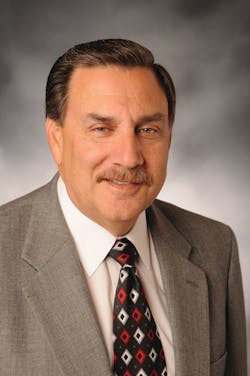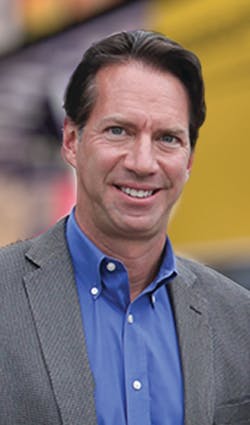Petrakis, Starkey look into the future of plastics
By Karen Hanna
With machine interconnectivity in demand, the future is bright for highly skilled workers, according to a representative from the Plastics Industry Association (PLASTICS). The Industry 4.0 Revolution awaits only continued advances in inter-machine communications.
“If somebody shows up at the NPE and says, ‘I’ve got this little thing I can plug in and it will upgrade your controls, and now your old machines can talk to the other ones,’ now you’ve got somebody you better pay attention to,” said Steve Petrakis, VP of PLASTICS’ Equipment Council. “I haven’t seen that yet, but I can’t believe with the minds that are out there, that somebody can't figure that out. And I’m sure they will, because otherwise the evolution is going to be too slow.”
Starkey, who is part of a task force to update the industry's guide for buying molds, and Petrakis both acknowledged that the auto industry has suffered a blow during the last year. But for parts makers and molders engaged in other markets, the news largely has been good, despite the tumult that marked life in 2020.
“All in all, it’s been kind of like a double whammy in a positive sense. The tariffs had evened the playing field a bit, but then just overall medical activity has been strong,” said Starkey, who believes efforts to make American manufacturing more competitive have helped the industry.
He predicted growth for molders, especially in the U.S., in the coming months, as customers could find security in awarding molding work closer to home.
“I think between the tariffs and COVID, it further has shifted a paradigm to work with tool makers that are in reach,” he said.
Related: Plastics Industry Association looks to revise mold-buying guide
Related: OEMs forecast bright future
As technology continues to evolve, Petrakis predicted ever-growing demand for skilled labor.
“Manufacturers of all kinds are cutting back their service departments, where they had service departments in the early days of this industry, they had service men who could fix anything. They could go out and listen to a molding machine and know exactly what’s wrong with it,” he said.
“People today have to go stand in front of a screen and wait until the screen tells them what’s going on. More and more, they are relying on somebody else to take care of their equipment because they’re busy worrying about how their business is going to grow.”
While this has resulted in fewer jobs in some molding shops, it’s created demand elsewhere for people who understand the technology. Increasingly, users of machines are turning not to their own staffs, but to employees of the makers of machinery and automation for help. And those companies are going to need more workers who can provide it.
For processors, who might own generations of models of machines, the challenge, Petrakis said, involves finding a common communications platform. Right now, if controls can't be upgraded, machines have to be replaced — a task a lot of molders can't afford.
“There’s got to be a way to take your steel, your electronics and your hydraulics and update it without having to replace it all,” he said.
Machine compatibility remains a hurdle, but Petrakis said it's one the industry continues to address.
“The thing that the auxiliary companies have to figure out is how to talk to all these different molding machines," said Petrakis, who came to PLASTICS after working at Thermal Care, Niles, Ill., a manufacturer of chillers and temperature controllers.
As he looks forward to retirement following NPE 2021 — which would be his 15th — Petrakis was confident the technology will get more sophisticated. When his grandkids are old enough, they might get as much encouragement to pursue technical programs as traditional college. That’s where the jobs will be, he said.
Like Starkey, Petrakis is bullish on what comes next.
“I think manufacturing in this country is going to keep growing,” he said.
Contact:
Plastics Industry Association, Washington, D.C., 202-974-5200, www.plasticsindustry.org
Progressive Components, Wauconda, Ill., 847-613-1377, https://procomps.com

